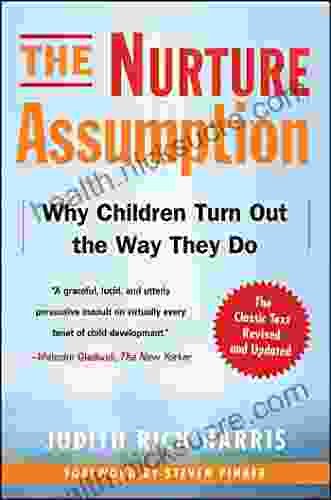Why Children Turn Out the Way They Do: The Impact of Nature, Nurture, and Life Experiences

4.5 out of 5
| Language | : | English |
| File size | : | 3764 KB |
| Text-to-Speech | : | Enabled |
| Screen Reader | : | Supported |
| Enhanced typesetting | : | Enabled |
| Word Wise | : | Enabled |
| Print length | : | 482 pages |
Every child is unique, with their own individual personality, strengths, and weaknesses. But what factors contribute to these differences? Why do some children turn out to be confident and outgoing, while others are shy and reserved? Why do some children excel in school, while others struggle?
The answer to these questions is complex, and involves a combination of nature and nurture. Nature refers to the genetic inheritance that children receive from their parents, while nurture refers to the environmental factors that surround them, such as their family, school, and community.
Nature
Genes play a significant role in shaping a child's development. Children inherit genes from both of their parents, and these genes influence a wide range of traits, including physical appearance, personality, and intelligence.
For example, research has shown that genes are responsible for about 50% of the variation in personality traits. This means that half of the differences in personality between children can be attributed to their genes.
Genes also influence intelligence, although the exact relationship between genes and IQ is still not fully understood. It is clear, however, that genes play a role in intelligence, and that children who inherit certain genes are more likely to be intelligent than children who do not.
Nurture
While genes play an important role in child development, nurture is also essential. The environment that children grow up in has a significant impact on their development, and can influence their behavior, personality, and overall well-being.
Some of the most important environmental factors that affect child development include:
- Family: The family is the most important environmental factor in a child's life. Children who grow up in supportive and loving families are more likely to be happy, healthy, and successful than children who grow up in families that are neglectful or abusive.
- School: School is another important environmental factor that can affect child development. Children who attend good schools are more likely to be successful in school and in life than children who attend poor schools.
- Community: The community that a child grows up in can also have a significant impact on their development. Children who grow up in communities that are safe, supportive, and have a strong sense of community are more likely to be happy and healthy than children who grow up in communities that are unsafe, unsupportive, and have a weak sense of community.
Life experiences
In addition to nature and nurture, life experiences also play a role in shaping a child's development. Life experiences can include anything from major events, such as the death of a loved one or a divorce, to minor events, such as starting a new school or making new friends.
Life experiences can have a positive or negative impact on child development. Positive life experiences, such as spending time with loved ones or achieving a goal, can help children to develop a positive self-image and a sense of competence. Negative life experiences, such as experiencing trauma or abuse, can have a negative impact on child development and can lead to problems such as anxiety, depression, and low self-esteem.
The interaction of nature, nurture, and life experiences
Nature, nurture, and life experiences do not operate in isolation. They interact with each other in complex ways to shape a child's development.
For example, a child who inherits genes for intelligence may be more likely to succeed in school if they also grow up in a supportive and loving family. Conversely, a child who inherits genes for shyness may be more likely to be outgoing if they grow up in a family that encourages them to socialize.
Life experiences can also interact with nature and nurture to influence child development. For example, a child who experiences trauma may be more likely to develop anxiety, even if they have inherited genes for resilience.
It is important to remember that every child is different, and that the combination of nature, nurture, and life experiences that will lead to a child's success will vary from child to child.
However, by understanding the role that each of these factors plays in child development, we can create environments that are more likely to promote healthy child development.
The question of why children turn out the way they do is a complex one. There is no single answer, but rather a combination of factors that interact with each other to shape a child's development. These factors include nature, nurture, and life experiences.
By understanding the role that each of these factors plays, we can create environments that are more likely to promote healthy child development.
4.5 out of 5
| Language | : | English |
| File size | : | 3764 KB |
| Text-to-Speech | : | Enabled |
| Screen Reader | : | Supported |
| Enhanced typesetting | : | Enabled |
| Word Wise | : | Enabled |
| Print length | : | 482 pages |
Do you want to contribute by writing guest posts on this blog?
Please contact us and send us a resume of previous articles that you have written.
 Fiction
Fiction Non Fiction
Non Fiction Romance
Romance Mystery
Mystery Thriller
Thriller SciFi
SciFi Fantasy
Fantasy Horror
Horror Biography
Biography Selfhelp
Selfhelp Business
Business History
History Classics
Classics Poetry
Poetry Childrens
Childrens Young Adult
Young Adult Educational
Educational Cooking
Cooking Travel
Travel Lifestyle
Lifestyle Spirituality
Spirituality Health
Health Fitness
Fitness Technology
Technology Science
Science Arts
Arts Crafts
Crafts DIY
DIY Gardening
Gardening Petcare
Petcare Lewis Carroll
Lewis Carroll Joel Thomas Chopp
Joel Thomas Chopp Allen Dulles
Allen Dulles Karen Bonnell
Karen Bonnell Bogdan Ivanov
Bogdan Ivanov Joe Kenn
Joe Kenn Dan Abrahams
Dan Abrahams Robert S Witte
Robert S Witte Helen Macdonald
Helen Macdonald Ethem Mining
Ethem Mining Christopher Bruhn
Christopher Bruhn Don Harris
Don Harris Steven J Burton
Steven J Burton Jon S Bailey
Jon S Bailey Kwame Onwuachi
Kwame Onwuachi Carla Simpson
Carla Simpson Brian Lopes
Brian Lopes Jeff Brent
Jeff Brent Bill Hendricks
Bill Hendricks Bobby Clampett
Bobby Clampett Scott Graham
Scott Graham Tom Kelly
Tom Kelly Chris Mulder
Chris Mulder Mandi Hickman
Mandi Hickman David Hancock
David Hancock Randy Olson
Randy Olson Randy Russell
Randy Russell Claude Levi Strauss
Claude Levi Strauss Winston Churchill
Winston Churchill Kate Wood
Kate Wood Allan Kardec
Allan Kardec Rowena Murray
Rowena Murray Jack Smith
Jack Smith Y R Davis
Y R Davis Daniel J Levitin
Daniel J Levitin Andrie De Vries
Andrie De Vries Toru Toba
Toru Toba Laura Randall
Laura Randall Mara Krechevsky
Mara Krechevsky Chris Fox
Chris Fox Rick Johnson
Rick Johnson Richard Kaczynski
Richard Kaczynski Maria Rickert Hong
Maria Rickert Hong Rex Allen Jones Ii
Rex Allen Jones Ii Nikki Solano
Nikki Solano Jean Jacques Chevron
Jean Jacques Chevron Christian Asonye
Christian Asonye Kara Lawrence
Kara Lawrence Noor Ain
Noor Ain Jim Rahtz
Jim Rahtz Walter Isaacson
Walter Isaacson Arianna Brooks
Arianna Brooks Allen Stroud
Allen Stroud Ian Westermann
Ian Westermann Sid Roth
Sid Roth Paul D Brinkman
Paul D Brinkman Richard M Van Gaasbeek
Richard M Van Gaasbeek Marie Osmond
Marie Osmond Tami Overhauser
Tami Overhauser Jimena Canales
Jimena Canales Marti Olsen Laney
Marti Olsen Laney Pamela Douglas
Pamela Douglas Charlotte Runcie
Charlotte Runcie Wendelin Van Draanen
Wendelin Van Draanen Tom Watson
Tom Watson Joanna Foley Rd
Joanna Foley Rd Teri Moser Woo
Teri Moser Woo Kristine Hudson
Kristine Hudson Raymond Turner
Raymond Turner Chip Coffey
Chip Coffey Robbin Gregory
Robbin Gregory Anna Leinberger
Anna Leinberger Saint Teresa Of Avila
Saint Teresa Of Avila Neely Spence Gracey
Neely Spence Gracey Lennard Bickel
Lennard Bickel Konnie Wong
Konnie Wong L H Nicole
L H Nicole Gary Sizer
Gary Sizer Giuseppe Mascoli
Giuseppe Mascoli Raychelle Cassada Lohmann
Raychelle Cassada Lohmann Sabatino Moscati
Sabatino Moscati Tom Daley
Tom Daley Leonard Shlain
Leonard Shlain Bill Varney Jr
Bill Varney Jr Allen Carr
Allen Carr Suzanne Nottingham
Suzanne Nottingham Alisha J Brown
Alisha J Brown Alexandra Amor
Alexandra Amor Linda Martella Whitsett
Linda Martella Whitsett Segun Adebajo
Segun Adebajo Alina A Von Davier
Alina A Von Davier Rachel Caine
Rachel Caine Alicia F Lieberman
Alicia F Lieberman John Bargh Ph D
John Bargh Ph D Myrna Blyth
Myrna Blyth Suzanne Alderson
Suzanne Alderson Debi Pearl
Debi Pearl Petr Zima
Petr Zima Sheena Byrom
Sheena Byrom Andrew Kastor
Andrew Kastor Godfrey Higgins
Godfrey Higgins Allen O Bannon
Allen O Bannon Eddie Guerrero
Eddie Guerrero Tom Babin
Tom Babin Apryl Baker
Apryl Baker Vincent Schilling
Vincent Schilling Maria Thompson Daviess
Maria Thompson Daviess Kate Clifford Larson
Kate Clifford Larson Elliot Aronson
Elliot Aronson James F Mckenzie
James F Mckenzie Robert M Sapolsky
Robert M Sapolsky Jeff Hawkins
Jeff Hawkins Kenji Tokitsu
Kenji Tokitsu Gavin Fairbairn
Gavin Fairbairn Erica Abbett
Erica Abbett Alison Aulakh
Alison Aulakh Aubrey Gordon
Aubrey Gordon Richard H Thaler
Richard H Thaler Peggy L Chinn
Peggy L Chinn Paul Schullery
Paul Schullery Ryan Hall
Ryan Hall Michele Stanten
Michele Stanten Jim Downs
Jim Downs Jim Cheney
Jim Cheney Meredith L Jacobs
Meredith L Jacobs Pass Your Class
Pass Your Class Michelle Nijhuis
Michelle Nijhuis The Editors Of Outside Magazine
The Editors Of Outside Magazine Diana Korte
Diana Korte Lynn Acton
Lynn Acton Susan Ware
Susan Ware John Novosel Jr
John Novosel Jr 10th Edition Kindle Edition
10th Edition Kindle Edition Daniel Stewart
Daniel Stewart Milton Gussow
Milton Gussow Roger Bannister
Roger Bannister Jason Padgett
Jason Padgett Kaitlyn Hill
Kaitlyn Hill Kenneth Igiri
Kenneth Igiri Jennifer E Smith
Jennifer E Smith Tim Roughgarden
Tim Roughgarden David M Killoran
David M Killoran Joshua Elliot James
Joshua Elliot James Mary Elizabeth O Brien
Mary Elizabeth O Brien Mike Zimmerman
Mike Zimmerman Alexander Clarke
Alexander Clarke Deborah Macnamara Phd
Deborah Macnamara Phd Emma Shelford
Emma Shelford Ron Merly
Ron Merly Matthieu Auzanneau
Matthieu Auzanneau Jeremy Evans
Jeremy Evans Victor Canning
Victor Canning Dennis Overbye
Dennis Overbye Sean Patrick
Sean Patrick Stuart Holmes Coleman
Stuart Holmes Coleman John Lloyd
John Lloyd Franz Kellermann
Franz Kellermann Karen Wambach
Karen Wambach Andrew Benfield
Andrew Benfield Kevin West
Kevin West Julie Morgenstern
Julie Morgenstern Robin Riley
Robin Riley James Patterson
James Patterson Holly Homer
Holly Homer Christina Hoff Sommers
Christina Hoff Sommers Chris Lear
Chris Lear Perry Lefko
Perry Lefko Grace E Stewart
Grace E Stewart The Dark Lords
The Dark Lords Laerke Recht
Laerke Recht Steve J Martin
Steve J Martin Rodney Ford
Rodney Ford Shawn D Madden
Shawn D Madden Kevin Leman
Kevin Leman Eric Newby
Eric Newby Grace Lindsay
Grace Lindsay Aliza Kelly
Aliza Kelly Cate Stillman
Cate Stillman John Macinnes
John Macinnes Chris Lundgren
Chris Lundgren Ken Cohen
Ken Cohen Tim Rappleye
Tim Rappleye Jorge Muniz
Jorge Muniz N B Hankes
N B Hankes Liz Clark
Liz Clark Alistair Cooke
Alistair Cooke Anil Seth
Anil Seth Pasco Valana
Pasco Valana Barbara De Angelis
Barbara De Angelis Kimberly Brown
Kimberly Brown Hilda Jarman Muir
Hilda Jarman Muir Allison Arevalo
Allison Arevalo Alicia Thomas Woolf
Alicia Thomas Woolf Mark Beauregard
Mark Beauregard Carla Mooney
Carla Mooney Peter Mark Adams
Peter Mark Adams Kelsey Banfield
Kelsey Banfield William W Dressler
William W Dressler Allen Morris Jones
Allen Morris Jones Eric Naguski
Eric Naguski Jim Mancuso
Jim Mancuso Selene Yeager
Selene Yeager Allen N Mendler
Allen N Mendler Gary Leland
Gary Leland Grant Petersen
Grant Petersen Pure Calisthenics
Pure Calisthenics Susan Kuklin
Susan Kuklin Allen G Taylor
Allen G Taylor John Michael Kelly
John Michael Kelly Robin Stevenson
Robin Stevenson Joel S Owen
Joel S Owen Bright Summaries
Bright Summaries Julie Currin
Julie Currin Cy Tymony
Cy Tymony Brian Boone
Brian Boone Chris Cannon
Chris Cannon Joseph Fort Newton
Joseph Fort Newton Greg Henry
Greg Henry Bryan Goodwin
Bryan Goodwin C Calvin Jones
C Calvin Jones Allison Tyson
Allison Tyson Frank Delaney
Frank Delaney P J Richards
P J Richards Trae Dorn
Trae Dorn Clive Cussler
Clive Cussler Allan G Bluman
Allan G Bluman Stephen E Flowers
Stephen E Flowers Charles J Robinson
Charles J Robinson Kim Liggett
Kim Liggett Alison Lighthall Miller
Alison Lighthall Miller Amy Saltzman
Amy Saltzman William B Helmreich
William B Helmreich Linda Greenlaw
Linda Greenlaw Mian Majid Ali Afzal
Mian Majid Ali Afzal Daniel J Siegel
Daniel J Siegel Lydia Sherrer
Lydia Sherrer Paul S Auerbach
Paul S Auerbach Sylvia Larsen
Sylvia Larsen J R R Tolkien
J R R Tolkien Robert Kiltz
Robert Kiltz Ryan Spaeder
Ryan Spaeder Alison Pearlman
Alison Pearlman Jared Cohen
Jared Cohen Philip Gosse
Philip Gosse Simone Milasas
Simone Milasas Roy Shepard
Roy Shepard Allen R Angel
Allen R Angel Bruce Tremper
Bruce Tremper Itzik Ben Gan
Itzik Ben Gan Stuart A Kauffman
Stuart A Kauffman George M Johnson
George M Johnson J Richard Gott
J Richard Gott Paul Green
Paul Green Annie F Downs
Annie F Downs D C Fergerson
D C Fergerson Stephen Haddelsey
Stephen Haddelsey Linda A Curtis
Linda A Curtis Gerd Gigerenzer
Gerd Gigerenzer C S Wilde
C S Wilde Joseph Harkreader
Joseph Harkreader Tami Asars
Tami Asars Thomas R Verny
Thomas R Verny Dennis Jarecke
Dennis Jarecke Shobi Nolan
Shobi Nolan Leah Vanderveldt
Leah Vanderveldt Paul J Kosmin
Paul J Kosmin William Stott
William Stott Joe Kelly
Joe Kelly Nick Riley
Nick Riley W Edwards Deming
W Edwards Deming Somaiya Daud
Somaiya Daud Kaylee Cole
Kaylee Cole Douglas Nicholas
Douglas Nicholas Katy Milkman
Katy Milkman Maria Hannay
Maria Hannay Bret Hart
Bret Hart Debra L Martin
Debra L Martin Jdmission Senior Consultants
Jdmission Senior Consultants Beth Cavenaugh
Beth Cavenaugh Dan Millman
Dan Millman Edmund G R Kraal
Edmund G R Kraal Allison Dolan
Allison Dolan Muthukumaran Mani
Muthukumaran Mani Dan Miller
Dan Miller Theodore B Sauselein
Theodore B Sauselein Allistair Mccaw
Allistair Mccaw Alicia Jasinska
Alicia Jasinska S Allen Counter
S Allen Counter Casi Mclean
Casi Mclean Jeff Gordon
Jeff Gordon Jennifer Louden
Jennifer Louden Sharon Weinberger
Sharon Weinberger Daniel Mendelsohn
Daniel Mendelsohn Carrot Quinn
Carrot Quinn Matt Hart
Matt Hart Jennifer Waldburger
Jennifer Waldburger Eugen Herrigel
Eugen Herrigel Lynn Stafford Yilmaz
Lynn Stafford Yilmaz Alison Scott Wright
Alison Scott Wright Jim C Hines
Jim C Hines Allan Phillips
Allan Phillips Alison Palmer
Alison Palmer Nick Karas
Nick Karas Allan Trevor
Allan Trevor Alistair Brownlee
Alistair Brownlee Amy Wenzel
Amy Wenzel Scott Smith
Scott Smith Matthew Mccoy
Matthew Mccoy Brian Treanor
Brian Treanor P Schreiber
P Schreiber Dave Pelz
Dave Pelz Sportsman S Connection
Sportsman S Connection Jenara Nerenberg
Jenara Nerenberg Mary Quinlan Mcgrath
Mary Quinlan Mcgrath Jim Cobb
Jim Cobb Signe Pike
Signe Pike Susan Neiman
Susan Neiman Alivia Stephens
Alivia Stephens Allison Mcdonald Ace
Allison Mcdonald Ace Lisa Marshall
Lisa Marshall W E Fairbairn
W E Fairbairn Felix Marks
Felix Marks Jason Durham
Jason Durham Ronald Hutton
Ronald Hutton Jonathan Moeller
Jonathan Moeller Jonathan St B T Evans
Jonathan St B T Evans Rene Almeling
Rene Almeling Lexie Scott
Lexie Scott Edwin Amenta
Edwin Amenta William A Haviland
William A Haviland David F Anderson
David F Anderson Cinda Williams Chima
Cinda Williams Chima Liz Evers
Liz Evers Jacqueline H Wolf
Jacqueline H Wolf Julie Schwietert
Julie Schwietert Phil Hornshaw
Phil Hornshaw Lisa M Rose
Lisa M Rose Sam Jefferson
Sam Jefferson John Kavanagh
John Kavanagh Milt Rosko
Milt Rosko Meritxell Castells
Meritxell Castells Rhonda Huettenmueller
Rhonda Huettenmueller Dr Fiona Mcpherson
Dr Fiona Mcpherson Alan Watts
Alan Watts Matthew Syed
Matthew Syed Tress Bowen
Tress Bowen Glenn Tinnin
Glenn Tinnin James Kipling
James Kipling Brenda Boyd
Brenda Boyd Linda S Jones
Linda S Jones Ed Robinson
Ed Robinson John Shewey
John Shewey Annabeth Headrick
Annabeth Headrick Vivian Gornick
Vivian Gornick David Eagleman
David Eagleman Harald B Teicher
Harald B Teicher Roy Macskimming
Roy Macskimming Lynn Rush
Lynn Rush Michael Reist
Michael Reist Eli Saslow
Eli Saslow Nevin Martell
Nevin Martell David Hurst Thomas
David Hurst Thomas Courtney Summers
Courtney Summers Alison Gervais
Alison Gervais Frederick Courteney Selous
Frederick Courteney Selous Grant S Lipman
Grant S Lipman Mark Kistler
Mark Kistler Norrinda Brown Hayat
Norrinda Brown Hayat Sarah P Morris
Sarah P Morris Kim Heacox
Kim Heacox Pottermore Publishing
Pottermore Publishing Brett Lee Scott
Brett Lee Scott John Bul Dau
John Bul Dau Henry Cloud
Henry Cloud Dennis Georgatos
Dennis Georgatos Charles Conn
Charles Conn George Buehler
George Buehler Linda Barrett Osborne
Linda Barrett Osborne Michael Fullan
Michael Fullan James Sieckmann
James Sieckmann Etienne Noumen
Etienne Noumen Frank Christianson
Frank Christianson Peter Hollins
Peter Hollins Karen Murphy
Karen Murphy Rebecca St James
Rebecca St James Sarah Grison
Sarah Grison Robert Penn Warren
Robert Penn Warren Allan Hall
Allan Hall Judith Mckay
Judith Mckay Despina Meris
Despina Meris Anna Costaras
Anna Costaras Eickhel Mendoza
Eickhel Mendoza Allen Everett
Allen Everett Don Miguel Ruiz
Don Miguel Ruiz Joosr
Joosr Dr Ron M Horner
Dr Ron M Horner Alistair Higham
Alistair Higham Robert Taylor
Robert Taylor Jonathan E Steinhart
Jonathan E Steinhart Allison Williams
Allison Williams Janet E Wall
Janet E Wall Priya Ardis
Priya Ardis Carlo Ancelotti
Carlo Ancelotti Natasha Devon
Natasha Devon Brenda Gable
Brenda Gable Lsatmax Lsat Prep
Lsatmax Lsat Prep Allan House
Allan House Rob Shelsky
Rob Shelsky Chris Chambers
Chris Chambers Marc Vachon
Marc Vachon Peter Van Der Linden
Peter Van Der Linden Ronald E Mickens
Ronald E Mickens Gregory Cochran
Gregory Cochran Fluent In Korean
Fluent In Korean Carl Paoli
Carl Paoli Dr Nadine Sinclair
Dr Nadine Sinclair Amby Burfoot
Amby Burfoot Geoff Salmon
Geoff Salmon Allison Schrager
Allison Schrager Molly Forbes
Molly Forbes Mary Bergin
Mary Bergin Olajumoke Adenowo
Olajumoke Adenowo Vitalis I Valentine
Vitalis I Valentine Allison Norfolk
Allison Norfolk Neil Hayes
Neil Hayes Ben Greenfield
Ben Greenfield Jeff Burlingame
Jeff Burlingame Dr Danielle Ward
Dr Danielle Ward Carolyn Shearlock
Carolyn Shearlock Deborah Ann Davis
Deborah Ann Davis Allen J Christenson
Allen J Christenson Maurice Isserman
Maurice Isserman Suzanne O Sullivan
Suzanne O Sullivan Aly Raisman
Aly Raisman Kate Mcmahon
Kate Mcmahon Emily Parke Chase
Emily Parke Chase Marc Bubbs
Marc Bubbs Iain Gately
Iain Gately Allen M Hornblum
Allen M Hornblum Travis Jeffery
Travis Jeffery Joe Vasicek
Joe Vasicek James Ferguson
James Ferguson Bill Horn
Bill Horn Greg Moran
Greg Moran Greg Strandberg
Greg Strandberg Lionel Cruzille
Lionel Cruzille Rex L Forehand
Rex L Forehand Patrick Stewart
Patrick Stewart Josephine Perry
Josephine Perry John C Lennox
John C Lennox Ann C Logue
Ann C Logue James Fallows
James Fallows The School Of Life
The School Of Life Mike Wallace
Mike Wallace Mark Dice
Mark Dice Tiger Woods
Tiger Woods Elce Junior Lauriston
Elce Junior Lauriston Jen Torborg
Jen Torborg Jeffrey E Young
Jeffrey E Young John Hughes
John Hughes Marlin M Mackenzie
Marlin M Mackenzie Carlos Castaneda
Carlos Castaneda Giancarlo Lemmi
Giancarlo Lemmi Robert Green
Robert Green Tim Baker
Tim Baker Judith Rich Harris
Judith Rich Harris Kota Nozomi
Kota Nozomi Todd Wilbur
Todd Wilbur Alister E Mcgrath
Alister E Mcgrath Judy Converse
Judy Converse Jim Bell
Jim Bell Justin J Exner
Justin J Exner Danica G Hays
Danica G Hays Jay Blahnik
Jay Blahnik Karen Blumenthal
Karen Blumenthal Valerie Gilpeer
Valerie Gilpeer Eric Lemarque
Eric Lemarque Mark F Sohn
Mark F Sohn Ashley D Kendall
Ashley D Kendall Naomi Kokoricha
Naomi Kokoricha Kathleen Bachynski
Kathleen Bachynski Tim Hodkinson
Tim Hodkinson Michael Shermer
Michael Shermer Catherine Gildiner
Catherine Gildiner Monique Joiner Siedlak
Monique Joiner Siedlak Mourad Boufadene
Mourad Boufadene Meredith Russo
Meredith Russo Arthur Aughey
Arthur Aughey Novak Djokovic
Novak Djokovic Gail Steketee
Gail Steketee Emily Thiede
Emily Thiede Michaelbrent Collings
Michaelbrent Collings Marianne Williamson
Marianne Williamson Stephen R Covey
Stephen R Covey Edmund Richardson
Edmund Richardson Douglas Whynott
Douglas Whynott Roy Clark
Roy Clark Joe Sparrow
Joe Sparrow Allison Alexy
Allison Alexy Frederick Mosteller
Frederick Mosteller
Light bulbAdvertise smarter! Our strategic ad space ensures maximum exposure. Reserve your spot today!

 Clayton HayesTarget Slope Measuring System: A Comprehensive Guide by Nick Riley, Surveying...
Clayton HayesTarget Slope Measuring System: A Comprehensive Guide by Nick Riley, Surveying...
 Jerry WardFirst Love - A Modern Tale of Love, Loss, and the Enduring Power of the Human...
Jerry WardFirst Love - A Modern Tale of Love, Loss, and the Enduring Power of the Human... Andrew BellFollow ·10.8k
Andrew BellFollow ·10.8k David Foster WallaceFollow ·14.4k
David Foster WallaceFollow ·14.4k Ervin BellFollow ·12.5k
Ervin BellFollow ·12.5k Hayden MitchellFollow ·19k
Hayden MitchellFollow ·19k Kenneth ParkerFollow ·3.5k
Kenneth ParkerFollow ·3.5k Emilio CoxFollow ·17.4k
Emilio CoxFollow ·17.4k Duncan CoxFollow ·16.9k
Duncan CoxFollow ·16.9k Edward ReedFollow ·7.6k
Edward ReedFollow ·7.6k

 Dominic Simmons
Dominic SimmonsFierce Attachments: A Memoir by Vivian Gornick - A...
Vivian Gornick's Fierce Attachments is a...

 Edison Mitchell
Edison MitchellPrimer for America's Favorite Wilderness: A Comprehensive...
In the vast...

 Jan Mitchell
Jan MitchellIntroduction to Probability: A Comprehensive Guide for...
Probability is a crucial branch of...

 Chuck Mitchell
Chuck Mitchell100,000 Mile Journey Into the Heart of America
In 2016, I embarked on a...

 Eddie Bell
Eddie BellHow Schools Around the World Are Inspiring Greatness One...
Education is the key...

 Quentin Powell
Quentin PowellJourney into the Heart of Alaska: Exploring the Majestic...
Alaska, the largest...
4.5 out of 5
| Language | : | English |
| File size | : | 3764 KB |
| Text-to-Speech | : | Enabled |
| Screen Reader | : | Supported |
| Enhanced typesetting | : | Enabled |
| Word Wise | : | Enabled |
| Print length | : | 482 pages |








